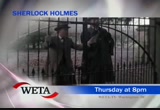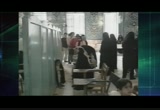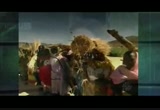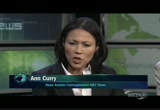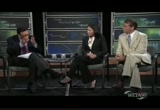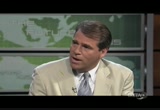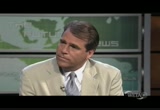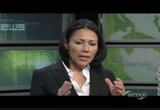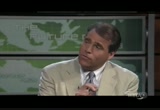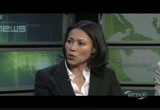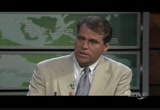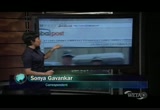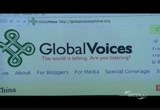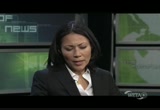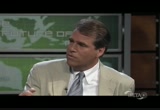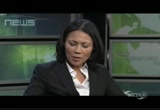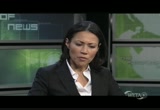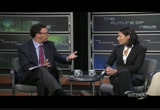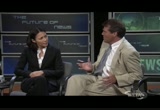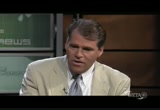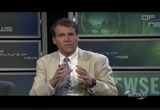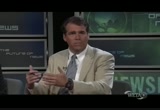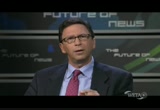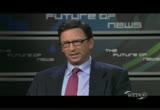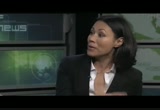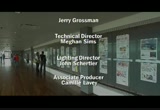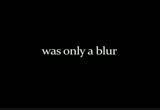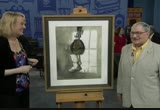tv The Future of News PBS January 10, 2010 10:00am-10:30am EST
10:00 am
>> this prograis brought to yoby a grant from the ford foundation... >> the world isound, pictures. as new americans are seeing less and less of thanews in scope d frequency. with dgets shrinking, newspapers and television networks have closed eensive foreign bureaus, leavi entire regions of the gbe uncovered, even as everything else has gone increasingly internatial. >>verything is so global that you just d't need to know wha's going on in your stater e united states. you better know what's gog on all over the rld. >> and i think that'the problem th american news is that we don't tie ough world news togetr and see that we'rell... >> in the same boa >>n the same boat, yeah. >> in the fure, how wi americanlearn about their world and get thinternational
10:01 am
news they need? that's our question todayn "the future of new" >> a government thout a tough and vibrant media all sorts is not aoption for the united states of america. >> i tnk the idea of gateway jourlism, of big networks and big newspapers beinghe only voices on the landscap is over. >> this idea of whats credible ultimately comes down to whoo you trust.ho has been trustworthy? >> from the knight stuos at the neeum in washington, d.c., i'm frank sesno. helloand weome to "the future of news," our coersation about old and nemedia and what it means for news and for all of us in e digital age. i'm happy to be joined today by 2 award-winng journalists in theorld of ternational reporting. ann curry of nbc news may be bt known for hework on the "today" show and "dateline,"ut she's also disnguished herself in global humanitarian
10:02 am
rerting. she reported on the crisis in darfur when few western reporters were the and has returned to rica repeatedly to cover th conflicts sudan, chad, and e congo. she's also repted from the middle st and from iran for that country's presidential election. crles sennott, longtimforeign correspondent for th"boston gle," was bureau chief in both jerusalem anlondon and has morehan 25 years of experience covering the world. 's now the exutive editor of a new venture, an entirely web-bed serve devoted exclusively to glob news. it's called globa post. so welme to you both. >> thank it's nice to see you, frank. >> all right, wenow what nbc is, let's let charles tell us: what is global post? >> wel global post is a new web site. it's free. it's called a stination site. so you can go to globalpost.com atime and draw on e stories that our correspondents, 65orrespondents in 50 countries, are coveringvery day. we saw a emendous portunity in this sort of
10:03 am
meltdown of traditional medi that's happening ght now. newspapers and netwos are struggling, and one of the things they've been cutting is their international ne. and we see opportunitthere because we think, as was poied out by some of the pple who were inteiewed in the introduction, everything is glob. if we want to understand thcollapse of the global economy, if we wa to undstand terrorism, if we want to understand clite changewe need a global approach. >> so, a example, twisting ar? hard to do? wha's the hook and the pay? very tough. historically, it's always been sort of the thinking that you do reporting out of afric then no one wilreally watch. and a lot of networks, ocourse, are concerned about--as nepapers are concerned about circulion, a lot of networks arvery coerned about ratings. so it takes act of i suppose deteination to get these stories in front of people.
10:04 am
think that, however,he arments are heard because there is a sense that theyust be done. i thinkhat the fact that i worfor so many broadcasts on nbc d i can convince many different executives, news executis, that they'll sayes. but i think thathe question you broach, which is reay an importt one: can traditional media this kind of reporting still? i think the ansr is no. and think that traditional medihas failed, actually, historically to donough in foreign coverage. >> how did you get to darfur how do you psuade people, or did they persuade you,hat that was thstory to go to? spend the time? spend e money? >> iitched a fit. >> [laughter] >> share it withs. >> i did. no, i did. younow, i--i've--throughout my time at nbc news, i have made stro arguments for stories. was furious at the coveragin bosnia, that we hanot done enough, and so i went to mboss and made a strong statemt, and i ended up actuay going. >> wt did you say that made--made t case?
10:05 am
>> "i believe this might b genode. the united states is calling it genocide. whave a moral obligation as urnalists and even broader as ericans to understand what's gog on there. inow it's tough to get in darfur, almost impossible, but weust go." so i made the argunt. >> charles, when she got tgo to darfushe had the cameras, she had a network,he got to llions of people. when your reporters goo darfur, who know >> yeah, wn our reporters go darfur, we are very much operating a more stealth mode. w're looking at live blogging fm the scene. we're looking to do form reporting that's well done, well researched, well writt, and welldited, as well. but we have a lot oopportunities to do multimedia.o we can have our coespondents all armed with these very simplelip cameras, whichost $250, and they are digitalideo. they can be edited on their lapps using fil cut pro, and we can send a 2-, 3-minute pieceack from
10:06 am
the field. >> is ere any chance, though, that this sort of thing ca possibly have e kind of impact that an n curry and an nbc can have? >> wel i think the idea of gatey journalism, of big networksnd big newspapers beinthe only voices on the landscap is over. and i think what we're in rit now is a sort of middleges. i wouldn't call it a gold age. we're alltruggling to find ouway forward. i think by the ddle ages, i mean the empis of big journalism are faing, and rising up are these smaller principalitiesand i ink they--like the middle ages, there's a timef great confusion and ferment an possibilitieand romance. and one thing i'll say is e of the grtest jobs you can have in the world ito be a foreign correspondent. and 's something i got do for many years for a traditionanews orgazation, and i'm very ankful for that opportunity. we at global post feelike we are about the next generion of foreign reporng. >> ann, when you think abo that impact that y can have with yr camera--and you
10:07 am
know becau when you come ck, people say they've seen it.nd you hear what charles is saying and you do your own--you're otwitter and every place l the time. wh about that impact? where is this taking us? >> oh, i think t future is extremely exciting. thdilemma is, how will it ok? who's going to pay f it? what kind of storiesan be done? here's my thinking. my thinki is that the united states has haa woeful--i mean, withll due respect--history in foreign work, reporting. even before thnewspapers started to havtrouble, even befo the networks had trouble, we were a ve myopic, self-focused country, d we still really large are, thinking aboutmostly concerned abouwhat's happening inside of america. and i think at especially that's acerbated by the tenor of our times today--woying about the economy--and, to se deee, that's understandab. but the ality is that not only is the internecausing these major ne organizations to have to change t way they do things, the internet igoing to change the way all ofs do things. younow, my daughter
10:08 am
is going to able to speak to someone in china,nd through goggle tralate or some otr tool, be able to buy something from her directl or somebody china or some her place directly, be able to communicate. the was of our nation, the edges our nation, are gog to become more sievlike, and as a result of th, every one of us is going to need to bmore smart globally. >> the question is, how is t public served? iall my years cnn, even there where there was a huge cmitment to global news, getting that global ne on the air andetting the ameran people, the public, to tune in was the chlenge. so when people vote wittheir mouse--or ce--and when they don't have it on nbc or e "new york times," the questi is, ll they go on their own? i think the answer is yes. think pele really understand that we e all connected globally. d i think they understa if they've ever been on vacation for one ek in europe a they've watched the bbc just for a wk, they'll comeome and say, "why don't
10:09 am
we have that? why don't have international covage?" >> we all say thatcharles, and agree, and this is a great concern. but wn you get out there and you see the nielse what people are actually clking on, is it the africa covera that's getting the attention? >>o. but here's the differencehere's whats exciting. wha's exciting is the internet is going to mean at you're gng to be able to click what you want. what happens with newspapers d television networks now is that we sort of-- report to a common denominator.ut, for example-- classic exple: we had hillary clinton in cgo, the place for the wot crimes, most brutal rapes againswomen, unimaginable crimes in t world. uniginable crimes was happening to women in cong and yet when the secreta of ate was asked a question and it was mistranslated about whether or not--whater husbanthought about some particular issue andhe got upset, that s the story. that was the story because e mainstream media thought tha was e story. but, in fact-- that is e of stories. but
10:10 am
ere was a bigger, deeper story th she was not really ableo fully bring light to... >> bause it goes thrgh the filter of thmedia. >>xactly. the internet will change that. >> can i make e maybe fairly radical statement, as we? >> we like radal statements. >> and this is goingo come from people who i have gotn to know whoere senior executives in network new who have argued to me,nd i think convincingly, that there was always th rap that no one wants foign news. and that was coming fr corporate because it's ry expensive. and the facis people do want forei news. and if you prent it in the hard-hitting way that peop like richardngel do on nbc or that you canee with really talentedtorytelling, where someone can make a story com ive and really take you ther people are riveted. theyare and they want toatch. but it's expensiv and the tension especially in the networks where it's mo expensive, has been, "can we ford it?"
10:11 am
>> how do you get arou that in this brave future? >> one of the st interesting ings about a startup like ou ishe metrics are unbelievable. we can see immediately wt people are reading and wt they're not. >> how many people are rding the glal post? >> we have 3 millionnique visito so far. and what we're seeing is ability to actually track ories that people want to read. nowwhat's the chemy of this is youever know. it could be on one thg. it could be aut, you know, a zoo that's closing in cai. or then on the next breath it could be about a very important story out climate change that hadn't gotten out therend that we broke and that's interesting. you can't predict it, t you can watch it, and think we're going to hava new way to judgthat. >> so if this is the fute, what does it lk like? well, sonygavankar is going to take us now to this sitand a couple ofthers. sonya, what are you finding? >> frank, t's start with we were taing about can be
10:12 am
found in theultimedia section of theireb site. that's where alof the journalists can actually loathat video. somethini saw, thought was interesting, was this ide show of the women of congo naging to retain their striking sen of stylen that conflict. now, if you're wonderinghat the itors are talking about, go to the chatterection where every day they highlht some of t important stories. they highlight them in very interesting way. theput it in "need to know," "want to kw," anthe "dull but important." another web site that we fin interesting is obalvoicesonline.org. this is more web 2. harnessing hundreds of blogge all over the world to coverhe world. goo "countries" to see what is being covered. here in china we can see in thmap that the blogosphere is really coveng ina: 10 articles and 29 link nothg says it better like the glob voices tagline: "the world is talkin are you listenin" now, global voices is a great examp of citizen media covering sries that are
10:13 am
often ignored. frank >> often ignoredbut we are listening. are bloggerbetter than tradition reporters at bringing us the rld? is this the future? so we oke to ivan sigal, thexecutive director of global voices online. he pos this questn for our guests he. >> my questi would be, are we really--aree best served by having infoation that is american news, or e we served by having information that comes from all over thworld and gives us a varietyf perspectiveshat we might not have considered? >> ann >> i think we' best served by having opportunity to ar from all voices. i think that pple should--in the future, they ll beble to pick and choose what they want to hear. the demma is going to what's accurate and what's not, a i think that's going to be the al issue beuse people have a hard time. there'a lot of mateal out on the internet now that'considered "reportingthat isn't true, that isn't right and acrate. ani think that understanding how to vet information,
10:14 am
information that's ven to you ofthe record, that is not sourced--iean, this is a problem. and i see a lot of problems with some the blo, and i see a lot positive thin with a lot of the blo, as wel so that's the future. >> charles? >> i would say tt it's really importt to hear voices from all over the wor. but i would alsoay we need an american voice for internatnal news. >> which iwhat you've tried to with global voice. i mean, you stated thaas an objective. >> global post's--reay, its tone ivery intentionally and unabhedly american. >> what does thamean? yeah. >> th's--i constantly want to clify this because what i do nomean is jingoistic. i don't mean nationalistic. i don't mean american interests mattemore than any other coury in the world.hat i mean is we have a great tradition of stotelling america, and i think as an americ public, we all have an eafor that. we know the kinds of stories that wean--we can hear and wch resonate for us as a country. we're looking to tell stories ithe world that do tt. and if we don't, we' not going to capture that
10:15 am
american audnce, which is the audience we want to go for. wanto say, "america is listening," aninvite the rest of the rld in on the conversation. >> now, you've got a mix ofveted columnts and young, you know, stringers who e posted all over the world. i actuallynow one of them, and spoke to him en i knew we were talking today. i e-mailed m. he's inairo. his name is theodore may. now, ann, 'm going to ask you about wh theodore told me about his jobecause i'interested in yo response. he said he this the future of journalism is going to revol arnd what he described as, "leaner, meaner, morversatile types of journists. the kind who will be able to repo, wre, blog, photograph, shoot vio, edit video, and promote his orer own work through social networking sites," because th's what he's doing. >> true. >>an we do that and still... >> i'm doinit. i feel like we're alreadyoing it. i mean, i'm shooting slls now, and i'm nobad. and i blog, although i hate that rd. i-- >> you have a twitr account?unt?
10:16 am
>> i havhalf a million followers. and, toe, that's a two-way nepaper. you know, we have, what, or 5 million ewers on the "today" show, about or 5 million on "datele," about 7 million on ightly." but now i still wan towitter because there's ories that i can't get those mainstreamews broadcasts, and there's still stories can't--information i can't t in. so i put a lot of that material on my itter te. and what i get is--from these half-a-million folwers get interaction. i get peopl asking questns, people wanting more information. and it's become kind of two-way broadcasti system. >> has it affectedour journalism and what you thin you should report and w you report it? >> no. it just has infirmed myit has reaffirmed my fundamental belief that ther are ma people in america who are underserd and in the world who are undeerved in terms of news and that we need to do better job.
10:17 am
>> we'reoing to turn to the auence now for some questions and have you join the conversati. good to see you. thanks. tell us what's your mind. >> i am a traditionajournalist and writerand my question for all of you is, h valid is material that is generatedrom social media, from bgs, twitter? >> ann? >> the validity is sti to be vett. and, unfortunately, i's vetted by individual urs versus the tradition way, as u well know, is vetted throu editors who make sure at it's accurate and havcarefully looked athe information. the lemma now is that it's l out there: all the ugly, a the prty--all of it. and the probleis that we're having to find--but arehere gems ther absolutely. absolutely there argems. >> how about an example? a the one thatay have defined this at this era, which wathe iranian presidential elections where e twitter news was inome cases--if it was news--was the vecle out for e information because so man reporters had been thrown ou
10:18 am
did yofind, having covered thattory yourself, that that was reliable informationhat was coming via those socl tworks? >> some of iwas not reliable, but the majori of it was reliable. you ve to look at it through e sieve that it's activist information. it's coming from the poinof view of peopl always when you're looking at infmation you have to understand the motivation as you wl know, of the person trying to gi you that information, and understding wh they want, why they want this information outhere. when you're upset about president ahmadinejad in ira d you're shooting protes, you know, you can lo at that imagery and you can say, "ok there are 5 pele there. i'm not really sure that waseal." but if y see 3,000 people, you know, getting shott, there's a kindf honesty in this. so you rt of have to vet that. i's a very difficult dilem we're in. ihink that's a very go question. >> i think it's great question because i share some of ur reservions about blogging. and i think--ann, you id, "i hate that word." i ink those ofs who've worked for our careers tryi to get
10:19 am
it right as journalists,hen you ar a citizen saying, "i can just wing it," yoknow, our backs go up. and i tnk they should becausi--i have always thought of our blgers, oucorrespondents who are bloggingwe call it a reporter's notebook. it's one of the great traditis of jonalism when you worked at a newspaper, y'd come back from a journey somewher-to iran or afghanistan or to wherever- and you got to what wacalled a porter's notebook. you st unloadhat you saw. that is grt and valuable, and that's blogging, but we call it rerter's notebook. >> well, there's somethg else that happens, too, if i y, and at is that that gets-- the editorooks at it. you get grilled. you get questio back abt that reporter's notebo. it's not st anything that you wanto write off the top of your head. >> that's true. but i do think there is something liberatin about just sing what you saw in an unfiltered w for people, as long as you putt in a place where your viewers of ur web site know that's dierent
10:20 am
an what they call a report. >> and let's go to the next question. >>y question is, how do you use, scree evaluate news stories that are produced by foign reporters and coespondents and use that information in reporti internatnal news? >> i think it's good question, and it speaks tohat i've described as grod truth. in a place li the middle east, if you want to understa the arab street, you need to be rding "al-ahram." yoneed to know the newspapers that e there in the arab world, and tha's done by oucorrespondents on the grnd. now we have the benefit of being able to grab them online. but i still think u need that correspoent there the ground who speaks the nguage, who can read the nepapers in that language, and who carelate to us, "this is what's happing from the perspective of theedia in this country," whether 's vernment-controlled media or whetr it's a free media. and think it always should be rt of a good report from a
10:21 am
foreign untry. >> let's take anotheruestion. >> i wk with the national academy of sences. ann, you spoke little bit about this, all of youduring your interview about how crible the news is. any pointeron how do you disce that? >> hmm. very gooquestion. >> charles, how wod you provide the scecard? >> i think credible news is the newthat tries to present you as manpoints of view as possible, but th has the courage to connect theots and not just prent the points.wy because e question comes from a scientist, is, for exale, one of the great flaws iour coverage of clime change has been to say, "ll, on the one hand, these are the peop who say there's problem and we're fine and gbal warming is a big mythand on the other hand, here are the people who say glob warming is very serious and it's gointo be what will imperil our lives for ny generations to come. i guesse won't solve is tonight. let's
10:22 am
move on." that's not thtruth. that's points, but you haven't nnected the dots. the way to connect the do is to say, "in thacademy of sciences there are 1,0 scientists, 990 of whom believe climate chan a great threat to this planet, you ow, and 10 of whom are funded andnderwritten by exxon o don't." and if we don'do the pointillism that is required to prent all the dots so that we can create a pictu, we're not doing credible journism. >> we want to take you bk now, courtesy of the newse archives, to one of thmost rivetingnternational stories of i day to show you what something looked like its term: rare newsreel foage from 19. the king of yugoslavia is shot. the otage was initially censed by the french. then it was transported, oe it was freed up, by ocean linero america. finally weeks ler, en in movie theaters, but by more than 30 millioneople.
10:23 am
>> ts is lowell thomas eaking, bringing you the pictures of the murder of e king of yugoslavia and the foreign nister of france. tragedy approacheswiftly now. in that galmultitude lurks a man wi a pistol, bound by a bod oath to kill the kinghe was a croatian terrorist,nd he's ready to strike. he strikes othe running board. 's slashed down by saber strokes. saying bullets hit the crow women fall wounded, hit by the rdom bullets. the police erwhelm him, tramp him. somebody picks uphe instrument of death: that devilish automic pistol. this historical film document w made by the fox movietone cameramen. the frencseized it, releasedt, and seized it again. butow movietone, thanks tthe speed of the s.s. "washington," ienabled to present this, the most histoc fi document of our time. >> thanks to the speed of e ocean line. newsreels were a
10:24 am
fact of life for decadesno one would have predicted by th mid-sixties, 10s, they'd completely disappear, t that's what happened. why? televisi. the immediacy of televion ept them aside, revolutioniz how people got their news. s now we'llee what technology s in store for us. ann, what do you think? >> listen, 'm extremely hoful. i think--because if you think about itrom the point of view of being a urnalist and you' thinking, you know, "oh, my gosh,'m worried about my job," then that's the wrg attitu. the attitude is, what will best serve the public d what we're talking abo has the possibility of servi americans and acally everyone across theorld in a much deeper, more prent way. i think, thoh, you raised a point. you raised a int: i thinit was about accuracy and tiliness. look, i think that youhould never, ever sacrifice accuracy for bng fit, and that is, think, the dilemma, i think, of the internet. ere's a lot of information th goes out. well, you saw at. that took a long time. that w all accurate, probably, because of the tim it took.
10:25 am
>> and, charles, in s day, that was revutionary. i mean, arly 100 years ago, just seeing that picture.0 seconds. >> what was true there, that clip from 1934and what will be true in 2034 is it's about being there. you have toe there. global posis about ground trh. that is the best example i've seen of a movie rl of ground truth. that person th that camera inheir hand was on the gund there reporting thstory, and that's what w need wther it's on the web or it's in a newoom. >> now your theo may oyour ann curry can take the flip phonand do it in real-time. and there you ha it: more informion more available to mo people than ever in human history. charles sennottglobal post, anks. >> thank you. >> ann curry, nbc. aalways, tremendous. thk you. >> a pleasure. >> and join us nt time for he future of news." i'm ank sesno,rom the knight studios at the newseumn washington, d.c.
331 Views
IN COLLECTIONS
WETA (PBS) Television Archive
Television Archive  Television Archive News Search Service
Television Archive News Search Service 
Uploaded by TV Archive on

 Live Music Archive
Live Music Archive Librivox Free Audio
Librivox Free Audio Metropolitan Museum
Metropolitan Museum Cleveland Museum of Art
Cleveland Museum of Art Internet Arcade
Internet Arcade Console Living Room
Console Living Room Books to Borrow
Books to Borrow Open Library
Open Library TV News
TV News Understanding 9/11
Understanding 9/11